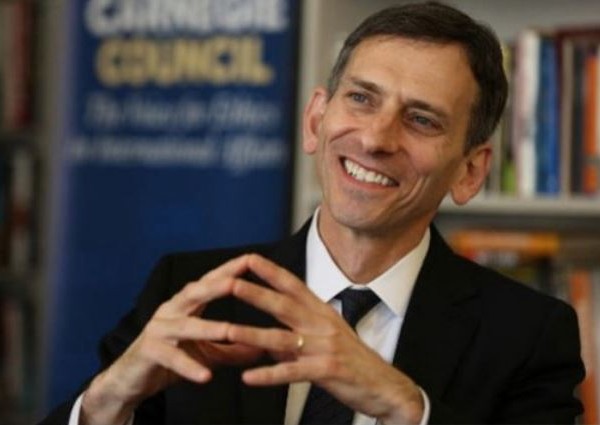
What did you study at Yale, and what is your current profession/job?
I am currently President of the Carnegie Council for Ethics in International Affairs in New York City. Founded in 1914, the Council is one of Andrew Carnegie original peace endowments. Today the Council produces educational programs for worldwide audiences. Activities include sponsored research, exchanges, and multimedia publication – including television broadcasts, podcasts, and the journal Ethics & International Affairs published by Cambridge University Press.
After undergraduate study at Harvard in History, I came to the American Studies program at Yale to take advantage of its interdisciplinary opportunities. I was interested in moral and ethical issues in American foreign policy such as human rights, intervention, nuclear deterrence, and environmental sustainability. I graduated in 1988, just as the Cold War was about to end – although we had no idea of that at the time.
What do you like most about your current role? What do you find most challenging and/ or rewarding?
A friend of mine describes the Carnegie Council as a “boundary organization.” The Council exists between scholarship and policy formation.
I think of the Council as an outward-facing classroom. It has given me the opportunity to create educational experiences in a setting that promotes engagement and affords a broad scope. It has enabled me to engage with leaders from government, academe, business, the media, and advocacy groups. Among the most inspiring were former British Prime Minister Gordon Brown, General Martin Dempsey, Chairman of the Joint Chiefs of Staff, and Bill McKibben, climate activist.
In a time when thoughtful, informed, and fact-based analysis is in danger of being overshadowed by polarization and extreme partisanship, it is rewarding to work in a place that is trying to steer a steady course.
How did your time at Yale shape your career trajectory?
Early in my academic career I was concerned that research communities were becoming hyper-specialized, narrow, and removed from social relevance. Americans Studies at Yale allowed me to retain the rigor of the disciplines while addressing pressing contemporary issues.
I read widely in political philosophy, political and diplomatic history, and literature. I spent time at the Divinity School library tracking down books by Reinhold Niebuhr; I became conversant in “pragmatism” through the works of William James; I listened to theories of nuclear deterrence. A lot of these threads came together in a security studies seminar where I met the likes of Admiral Stansfield Turner and Paul Kennedy.
What are the main skills that you acquired as a PhD student which help make you successful in your current career?
While this may sound antiquated, I learned to read and write as a scholar and teacher. I learned what it meant to do original research. I worked on producing “reader-based” prose instead of “writer-based” prose. I learned to master a field of expertise and then make my own contribution to it.
I also learned about the importance of mentors. Gaddis Smith, R.W.B. Lewis, Robert Westbrook and many others — they were big thinkers; they encouraged creativity; they wrote for both expert and general audiences. My mentors were not trying to reproduce anything or manufacture outcomes. They encouraged me to think for myself, and to roam widely.
Did you acquire any professional experience related to your line of work while in graduate school?
Among the most important things I learned in graduate school is how to teach. Carnegie Council is not a traditional classroom – but it is a place where people come to learn. I would encourage graduate students to consider opportunities outside the usual educational track. In today’s world of digital communication and lifelong learning, the possibilities are limitless.
One of the most rewarding administrative experiences I had was directing the College Seminar program at Ezra Stiles College. The head of the College at the time was Heinrich von Staden. He was an inspirational scholar who showed though example how to build a great learning community involving students as co-creators rather than consumers. In the seminar program we were able to offer unconventional options. I remember bringing notable people to campus including poets, actors, and government officials.
What advice would you offer PhDs who are interested in your line of work?
Develop an expertise that is distinct. Ask and answer the questions: What can I contribute that is original to my field? How will this make its way in the world?
Be open to new ideas and new people outside of the classroom. Pay attention to relationships inside and outside of Yale. Go out and network in a purposeful way. Think about how your academic inquiry has bearing on society. Try to make connections that bring your scholarship and societal challenges into alignment. Be in the world, not apart from it.
Finally, stay in touch with your graduate school classmates. They will be your friends for life.
